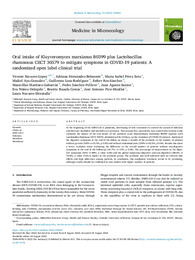Title:
Oral intake of Kluyveromyces marxianus B0399 plus Lactobacillus rhamnosus CECT 30579 to mitigate symptoms in COVID-19 patients: A randomized open label clinical trial |
Authors:
navarro-lopez, vicente 
Hernández Belmonte, Adriana 
Pérez Soto, Maria Isabel
Ayo González , Maikel 
Losa Rodríguez, Guillermo
Ros-Sánchez, Esther
Martínez Gabarrón, Maravillas
Sánchez-Pellicer, Pedro
Aguera Santos, Juan
Núñez-Delegido, Eva
Ruzafa-Costas, Beatriz 
Pico-Monllor, JOSE ANTONIO 
Navarro-Moratalla, Laura |
Editor:
Elsevier |
Department:
Departamentos de la UMH::Farmacología, Pediatría y Química Orgánica |
Issue Date:
2022-08 |
URI:
https://hdl.handle.net/11000/36545 |
Abstract:
At the beginning of the SARS-CoV-2 pandemic, developing of new treatments to control the spread of infection
and decrease morbidity and mortality are necessary. This prospective, open-label, case-control intervention study
evaluates the impact of the oral intake of the probiotic yeast Kluyveromyces marxianus B0399 together with
Lactobacillus rhamnosus CECT 30579, administered for 30 days, on the evolution of COVID-19 patients. Analysis of
the digestive symptoms at the end of the follow up shows a benefit of the probiotic in the number of patients
without pyrosis (100% vs 33.3%; p 0.05) and without abdominal pain (100% vs 62.5%; p 0.04). Results also show
a better evolution when evaluating the difference in the overall number of patients without non-digestive
symptoms at the end of the follow-up (41.7%, vs 13%; p 0.06). The percentage of improvement in the digestive
symptoms (65% vs 88%; p value 0.06) and the global symptoms (digestive and non-digestive) (88.6% vs
70.8%; p value 0.03) is higher in the probiotic group. The probiotic was well tolerated with no relevant side
effects and high adherence among patients. In conclusion, this coadjutant treatment seems to be promising,
although results should be confirmed in new studies with higher number of patients.
|
Keywords/Subjects:
COVID-19
SARS-CoV-2
Probiotics
Microbiota
Microbiome |
Type of document:
info:eu-repo/semantics/article |
Access rights:
info:eu-repo/semantics/openAccess
Attribution-NonCommercial-NoDerivatives 4.0 Internacional |
DOI:
https://doi.org/10.1016/j.medmic.2022.100061 |
Published in:
Medicine in Microecology 2022 Dec:14:100061 |
Appears in Collections:
Artículos - Farmacología, Pediatría y Química Orgánica
|

.png)
